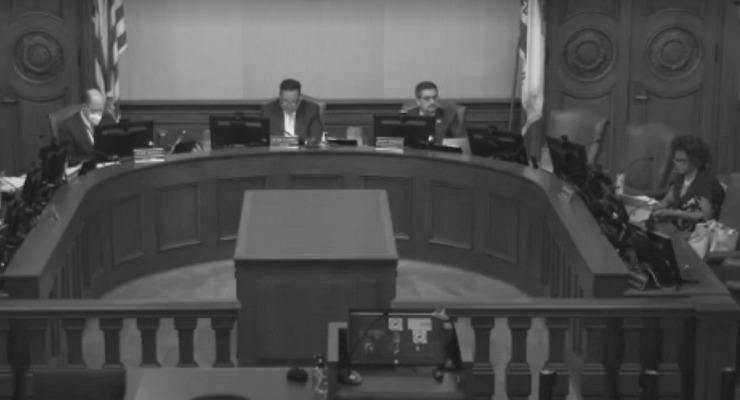Although nearby cities have been forced to offer buyouts to their employees, as of now Pasadena has no plans to follow suit.
“Thankfully, no, we are not headed in that direction at this point,” said city Public Information Officer Lisa Derderian.
Last week, South Pasadena offered 10 employees early retirement deals, including South Pasadena City Manager Stephanie DeWolfe, who formerly worked for the city of Pasadena.
In Los Angeles, the City Council will vote to pay employees up to $80,000 to retire. If enough employees don’t take that deal, up to 15,000 employees could be furloughed without pay one day every two weeks.
Locally, the city’s revenues so far are $12.7 million below budget, with about $4 million still expected to come in. But expenditures are trending in the right direction and remain below budget, offsetting revenue losses.
Property tax payments in July totaled $671,000, in line with projections, with the sales tax generating an extra $1 million.
“This is a positive sign,” said Finance Director Matthew Hawkesworth. “The June payment was down 32 percent and July was expected to be down 20 percent.”
Councilman Victor Gordo, who sits on the Finance Committee, called the city’s financial structure “complex.”
“We are going to have to monitor [city finances] closely and be prepared to make critical decisions if we need to,” Gordo said. “At the moment, we are weathering the storm. We are hopeful the economy turns around for everyone.”
Total sales tax revenue came in at $52.8 million, 3 percent less than the fiscal year projection, but that shortfall could be covered in the August payment, according to a city staff report.
Construction, business license, and street light and traffic signal taxes are up by $575,000, despite a projected $500,000 loss.
The anticipated loss for licenses and permits has been reduced from $600,000 to $436,000.
The city has also taken on the Rose Bowl debt, over $8 million. The debt was incurred after the stadium was forced to cancel its events.
The city has also exhausted its Unassigned General Fund Balance, according to the staff report, and the city’s General Fund Operating Reserve is down from $13.7 million to $3.4 million after COVID-19 commitments are accounted for.
The depletion of the operating reserve was described in a staff report as a cause for concern. The amount does not include potential reimbursements, including FEMA reimbursements for the coronavirus surge unit built at the Convention Center, which could be years away.
The city has money remaining in its 15 percent emergency contingency fund.
“The Unassigned General Fund balance is a fund balance in excess of our net 20 percent reserve requirements,” said Hawkesworth. “These funds have generally been used to fund specific projects or needs and there is no need for alarm. For example, the City Council appropriated funds for the replacement of the Police Department Computer Aided Dispatch System and allocated funds to the General Liability Fund in light of the city’s self-insured retention increase from $3 million to $5 million. All of these items are done via council approval with accompanying staff reports.”
Measure I revenues will come in about $2 million more than expected. Personnel expenditures are also trending below budget.
Revenue from Measure I, a three-quarter sales tax passed by voters last year to help the city stave off mounting budget woes, has helped preserve city services during the crisis, coming in about $2 million more than expected.
“The long and the short of it is that COVID has blown a big hole in the city budget, roughly $12 million in the last fiscal year and anticipated another probably $18 million this year,” said Mayor Terry Tornek. “It’s eaten up a good chunk of our reserves. That’s why we have reserves for a rainy day, and it’s pouring outside. This is the time you spend it. It’s not gratuitous. If we didn’t have Measure I, we’d be up the creek.”
According to Tornek, Measure I funds were originally scheduled to go to capital improvement projects (CIPs) and, instead, have been used for various programs to provide assistance during the pandemic.
“We can provide some of these other programs that we hadn’t budgeted for, like the feeding programs at the PUSD sites and the food banks, the food security programs, and the small business assistance programs.”
In April, the City Council heard a downbeat report from Hawkesworth predicting “significant and prolonged” revenue losses.
Among those details were the “Transient Occupancy Taxes,” or TOTs, paid by hotels, which have nosedived as occupancy has plummeted to between 10 and 15 percent.
TOT revenues came in at $269,900, in line with estimates.
TOT funds will end up about $5.2 million below budget.
“Ongoing occupancy and daily rates will be critical,” the report said. The Langham Huntington Hotel reopened at the end of July.
“We adopted a very conservative city budget for (20)21 and it runs through June 30th,” Tornek said. “And when we start the budget process again in February and March, we’ll just have to see what’s happening in the world and we’ll budget accordingly, but we’ve always budgeted conservatively. We’ve never been, you know, sort of cross your fingers and hope for the best, which is why we’re in the shape we’re in. We’re in good shape, relatively good shape. But that’s not going to change. Our budget practices are not going to change.”














 0 comments
0 comments



